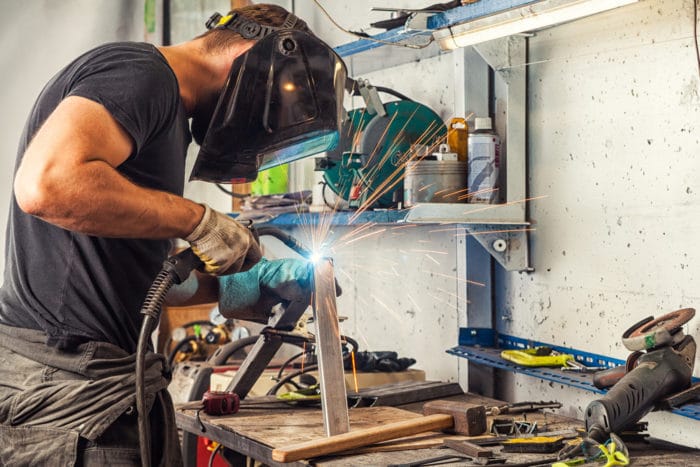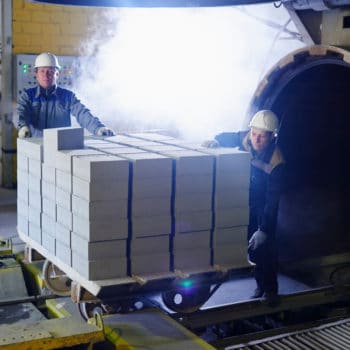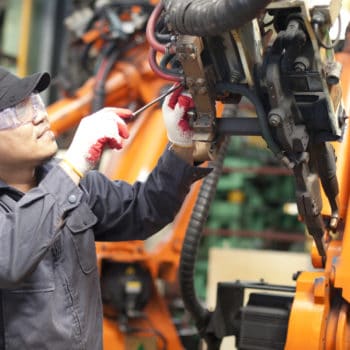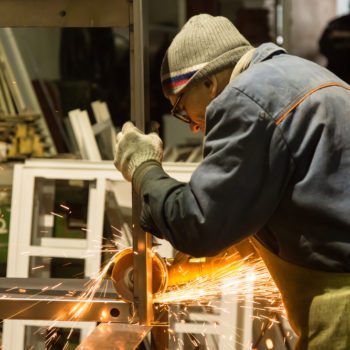Why We Love It
-
$48,210Potential Avg. Salary
-
-21%Job Growth Rate
-
Don't Take Work HomeCareer Attribute
-
Outdoor Work EnvironmentCareer Attribute
Utilizing hand-welding or flame cutting tools, a fabricator’s primary duty is to weld together a set of components like metal parts, for making the whole equipment or product. Such a tradesperson has to create moulds, metal casting patterns, and work with a wide range of materials.
Recommended Schools
What is a Fabricator?
Duties
There are several duties performed by a fabricator based on their specialist and what they assemble. The following list presents the main tasks:
- Review technical drawings to source materials and equipment as needed for completion of the product
- Regularly operate various hand or machine tools and welding equipment for efficient project management
- Assemble different parts and structures through lining them up and joining via welding, riveting or bolting
- Polish, clean, file or coat products in acid solution to add a layer of protection or a clean finish
- Alter metal products into different shapes and sizes by cutting, rolling, spinning, heat treating, hammering and bending it to fabricate parts.
Day In The Life
Your job can be straightforward or very complex, depending on the type of work you take on for the assembly process. As a metal fabricator, you can perform different types of work related to the metal product, whether it is a simple part like a toy or a big piece of equipment like a truck.
On an average day, most of your time will be spent preparing metal parts of machine or equipment assembly. But you will also have to evaluate each finished product and test them thoroughly for durability and performance. Projects are assigned as per expertise area, and you are also given a verbal brief or preliminary drawings to work off of.
Some clients might have individual requirements, requiring an original product. In this case, a fabricator needs to work with the research and development department in order to come up with feasible designs. Thus, innovation is a distinct advantage of working as a metal fabricator. Tight production deadlines also mean that you work at a fast-pace and create the best version of a product within that time on a daily basis.
Work Schedule And Typical Hours
The work schedule as a fabricator can often be gruelling, with an average of 45 hours per day from Monday to Friday. You would also have to be comfortable with strenuous activity since a large part of the role requires the strength to handle materials, tools and heavy machinery.
Growth Of The Job
There will be a steady market for employment opportunities in the manufacturing sector. Some industries such as administrative and support services, will have need of temporary fabricators. Employment services industry will also require the specialty of fabricators to meet fluctuations in the market and provide additional labour to a wide range of businesses.
Applicants with technical vocational training or professional certification will have a competitive edge over others, especially in growing tech-based roles such as fabrication for aerospace or electro-medical equipment.
Typical Employers
Most employers work with manufacturing plants or construction companies like Sabre Industries, Inc., Industrial Mechanical, Inc., Hoskin and Muir, Inc ., TPG Marine, Heico Construction Group, Lockport Steel Fabricators, etc. They are also hired by staffing firms (e.g. Onin Staffing, Express Employment Professionals, Elwood Staffing, Monroe Staffing Services) that provide a wide range of recruitment opportunities for businesses as needed.
Recommended Schools
How To Become a Fabricator
Education is typically based on the industry you want to join as a fabricator. You will need at least a high school diploma or equivalent credentials to find work as an assembler or fabricator. In most cases, aspiring candidates receive on-the-job training which includes technical training provided by the employer post-hire.
If you are interested in joining a specialized industry, such as electronic, aircraft, electrical and vehicle product manufacturing, then you would need to complete formal education for a technical school or get an associate’s degree. Coursework must help you master knowledge of the properties of different welding rods or fluxes, and the properties of various metals. A forklift truck qualification or license is desirable for many work positions.
In addition, certain skills are an advantage if you are seeking employment as a fabricator. For instance, much of the work requires extreme attention to detail such as identifying colored wires, different electronic components to put together efficiently. You should also cultivate a good hand-eye coordination since you will have to manually work with different products for assembling. Understanding mechanical designs and blueprints, working with machines and motion control robots may also be a requirement.
Fabricator Salary Data
We’ve provided you the following to learn more about this career. The salary and growth data on this page comes from recently published Bureau of Labor Statistics data while the recommendations and editorial content are based on our research.
National Anual Salary
Low Range
$33,920Average
$48,210High Range
$74,940National Hourly Wage
Low Range
$16/hrAverage
$23/hrHigh Range
$36/hrHow do Fabricator salaries stack up to other jobs across the country? Based on the latest jobs data nationwide, Fabricator's can make an average annual salary of $48,210, or $23 per hour. This makes it an Above Average Salary. On the lower end, they can make $33,920 or $16 per hour, perhaps when just starting out or based on the state you live in.
Salary Rankings And Facts
#412 Nationally for All Careers
Highest Education Among Fabricators
- 0.3% Doctorate
- 0.1% Masters
- 4.1% Bachelors
- 5.1% Associates
- 23.5% College
- 50.8% High School
- 16% Less than High School
Job Growth Projections and Forecast
2014 Total Jobs
6,2002024 Est. Jobs
4,900Job Growth Rate
-21%Est. New Jobs
-1,300How does Fabricator job growth stack up to other jobs across the country? By 2024, there will be a change of -1,300 jobs for a total of 4,900 people employed in the career nationwide. This is a -21% change in growth over the next ten years, giving the career a growth rate nationwide of Below Average.
Growth Rankings And Facts
#792 Nationally for All Careers
What Companies Employ The Most Fabricators
| Industry | Current Jobs | New Jobs Needed | % Increase |
|---|---|---|---|
| Metalworking machinery manufacturing | 800 | -200 | 0% |
| Motor vehicle parts manufacturing | 500 | -100 | 0% |
| Engineering services | 400 | --- | --- |










